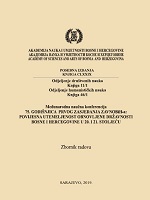TEMELJNI KONSTITUTIVNI PRINCIPI U STAVOVIMA PREDSJEDNIŠTVA REPUBLIKE BOSNE I HERCEGOVINE TOKOM PREGOVORA O MIRU 1992-1995.
FUNDAMENTAL CONSTITUTIVE PRINCIPLES IN THE ATTITUDES OF THE PRESIDENCY OF THE REPUBLIC OF BOSNIA AND HERZEGOVINA DURING THE 1992-1995 PEACE NEGOTIATIONS
Author(s): Mesud Šadinlija
Subject(s): History of Law, Constitutional Law, Military history, Political history, Transformation Period (1990 - 2010), Wars in Jugoslavia
Published by: Akademija Nauka i Umjetnosti Bosne i Hercegovine
Keywords: Bosnia and Herzegovina; war 1992-1995; Constitutional principles; Diplomacy; Peace plans;
Summary/Abstract: The fundamental principles of the renewed statehood of Bosnia and Herzegovina were defined by the decisions of ZAVNOBIH (The State Antifascist Council for the National Liberation of Bosnia and Herzegovina) and improved within the constitutional-legal and political construction of the Republic as an equal member of the Yugoslav Federation from the First Session of ZAVNOBIH in Mrkonjić-Grad on 25 November 1943 to the constitutional amendments adopted in 1990 according to which it is defined as “a democratic sovereign state of equal citizens, the people of Bosnia and Herzegovina – Muslims, Serbs, Croats and other people and nations who live in it”. The author is engaged in how these principles were represented and articulated in the attitudes of the Presidency of Bosnia and Herzegovina during the peace negotiations conducted in various formats of the International Conference on the Former Yugoslavia in the period from February 1992 to November 1995, by negotiators and international peacekeepers, as well as their compatibility with the constitutional-legal basis of individual peace plans for Bosnia and Herzegovina.
- Page Range: 249-266
- Page Count: 18
- Publication Year: 2019
- Language: Bosnian
- Content File-PDF

